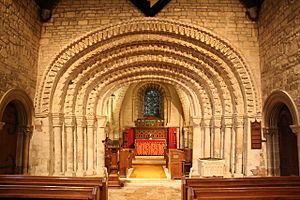St Peter's Church, Tickencote facts for kids
Quick facts for kids St Peter's Church, Tickencote |
|
|---|---|

The remarkable chancel arch in
St Peter's Church, Tickencote |
|
| Lua error in Module:Location_map at line 420: attempt to index field 'wikibase' (a nil value). | |
| OS grid reference | SK9904409492 |
| Location | Tickencote, Rutland |
| Country | England |
| Denomination | Church of England |
| History | |
| Dedication | St Peter |
| Architecture | |
| Heritage designation | Grade I |
| Designated | 14 June 1954 |
| Architect(s) | Samuel Pepys Cockerell (restoration) |
| Architectural type | Church |
| Style | Norman Romanesque Revival architecture |
| Specifications | |
| Materials | Limestone Collyweston slate |
| Administration | |
| Diocese | Diocese of Peterborough |
| Province | Canterbury |
St Peter's Church in Tickencote, Rutland, is a historic Church of England building. It's famous for its amazing Norman parts, especially the chancel arch and the special ceiling in the chancel. These parts were built in the mid-1100s. Most of the church was rebuilt in 1792. This work was paid for by Miss Eliza Wingfield and designed by the architect Samuel Pepys Cockerell.
In 2019, the Churches Conservation Trust took over caring for the church. St Peter's was closed for a while for important repairs. It reopened to visitors in June 2022.
Contents
Exploring the Church's Design
The church has a main area called the nave, a chancel, and a two-story tower. There is also a bell-stage on the south side. A transept on the north side is used as a vestry. The tower also works as the main entrance. The church is built from local limestone. Its roofs are made of Collyweston slate, and it has sloped gables.
The Chancel: A Special Area
The chancel is the part of the church near the altar. It has a unique ceiling called a sexpartite vault. This vaulted ceiling and its carvings are very old. They might have been put back together in 1792 when the church was rebuilt. At that time, the chancel was covered with new stonework. This new work was decorated in a Romanesque Revival style.
The restored east end of the chancel has decorative arches that look like they are carved into the wall. These arches have round tops and round columns. There is a round-headed east window with leaf patterns. It also has a special "billet-moulded" pattern that continues around the sides. There were once taller, narrower windows in a room above the chancel. This room is now blocked off.
The Amazing Chancel Arch
The most impressive part of St Peter's Church is its round-headed chancel arch. It dates back to the mid-1100s. This arch has six layers of detailed decorations. Each layer is called an "order."
- The inner layer has a simple roll shape.
- The second layer has "beak-heads," which look like bird heads.
- The third layer has zig-zag patterns and continuous crenellations (like castle battlements).
- The fourth layer shows different heads, including a king and queen, other figures, animals, and a green man (a face made of leaves).
- The fifth layer has more zig-zags.
- The sixth layer has an abstract version of the beak patterns.
The very edge of the arch is decorated with a billet moulding.
The Tower and Entrance
The church tower has a pyramid-shaped roof. It holds the church bells. Before 1792, these bells hung in a small bell-house at the west end of the chancel. The tower also serves as the entrance porch. The entrance has a round top with roll-moulded layers. Above the door, there is a special carved panel called a tympanum. It has a tablet dedicated to Eliza Wingfield, who paid for the church's restoration in 1792.
The nave is the main part of the church where people sit. The original nave was from the later medieval period. It was completely rebuilt during the 1792 restoration. The font, used for baptisms, is in the Romanesque style. It was made a little later than the chancel arch. Today, the font is close to the chancel arch. However, an old plan from the 1700s shows it was originally closer to the west end on the north side. The outside decoration of the nave is a more creative take on the Romanesque style. It is one of the earliest examples of Romanesque Revival architecture in Britain.
Notable Burials
Some important people are buried at St Peter's Church:
- Thomas Cromwell, 1st Earl of Ardglass, and his wife Elizabeth.
- Sir Edward Wingfield and his wife Mary Georgina.
Images for kids
 | Kyle Baker |
 | Joseph Yoakum |
 | Laura Wheeler Waring |
 | Henry Ossawa Tanner |








